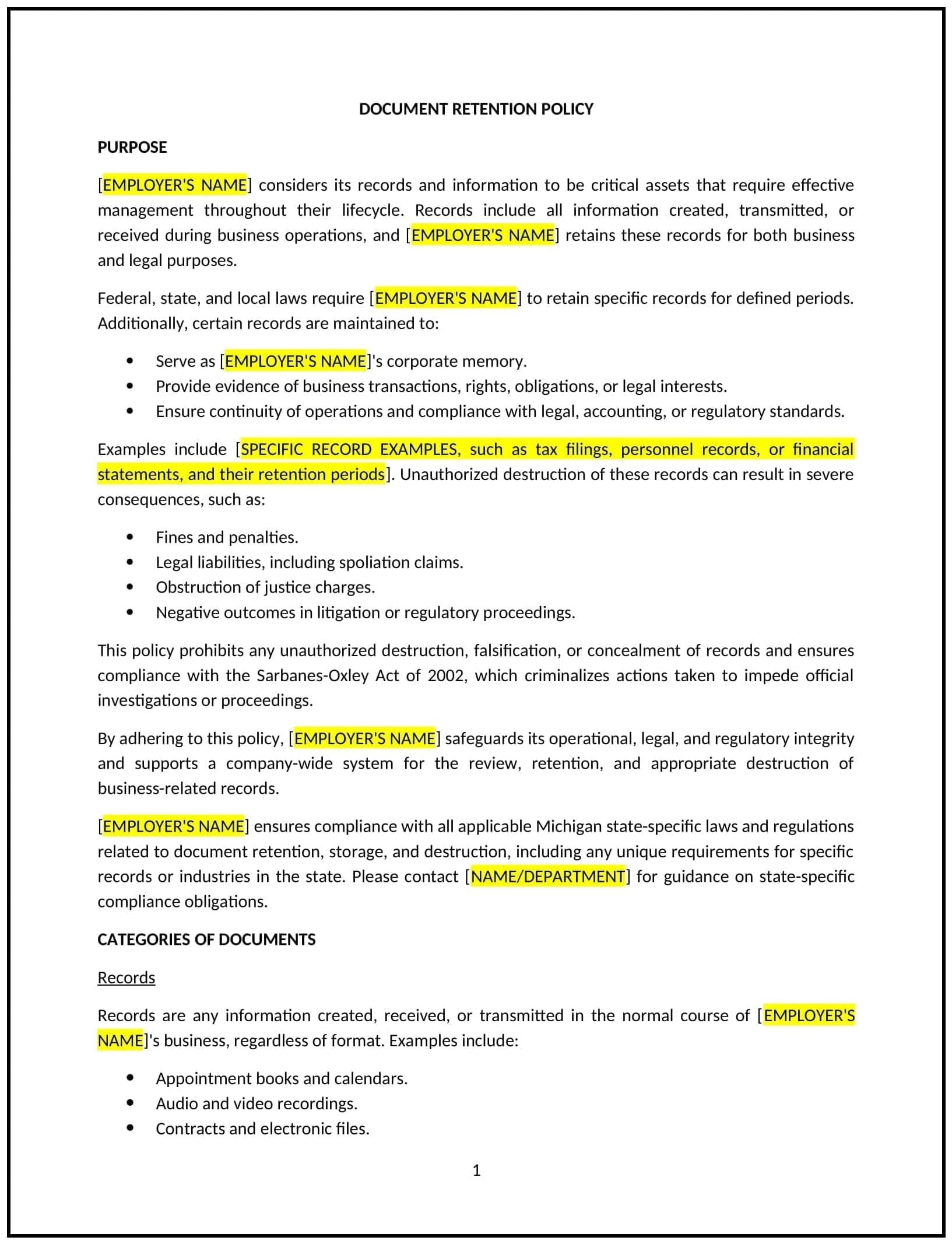Document retention policy (Michigan): Free template
Got contracts to review? While you're here for policies, let Cobrief make contract review effortless—start your free review now.

Customize this template for free
Document retention policy (Michigan)
A document retention policy provides Michigan businesses with guidelines for how to manage, store, and dispose of business records. This policy ensures that documents are kept for the appropriate amount of time, comply with legal requirements, and are securely disposed of when no longer needed.
By adopting this policy, businesses can reduce the risk of retaining unnecessary documents, improve operational efficiency, and ensure compliance with Michigan state laws and federal regulations regarding document retention.
How to use this document retention policy (Michigan)
- Define document types: Clearly identify which types of documents are covered by the policy, including financial records, contracts, employee records, emails, and other business-related documents.
- Set retention schedules: Establish how long each type of document should be retained based on legal requirements, industry standards, or business needs. For example, financial records may need to be retained for seven years, while employee records may be kept for a shorter period.
- Implement storage guidelines: Specify how documents should be stored, whether physically or electronically, and outline any security measures that must be in place to protect sensitive information from unauthorized access.
- Outline document disposal procedures: Provide clear guidelines on how documents should be securely disposed of once the retention period has expired, including shredding physical documents and permanently deleting electronic files.
- Address legal compliance: Ensure that the policy aligns with Michigan state laws and federal regulations, including industry-specific requirements for document retention, such as those related to taxes, healthcare, or financial services.
- Create a tracking system: Implement a tracking system to monitor document retention and disposal, ensuring that documents are kept for the required time and disposed of in a timely and secure manner.
- Educate employees: Train employees on the document retention policy to ensure that everyone understands how to handle documents appropriately and comply with the retention schedule.
Benefits of using this document retention policy (Michigan)
This policy provides several key benefits for Michigan businesses:
- Promotes legal compliance: Helps businesses comply with Michigan state laws and federal regulations related to document retention, reducing the risk of legal penalties or audits.
- Reduces storage costs: By managing the retention and disposal of documents, businesses can reduce the costs associated with storing unnecessary or outdated records.
- Improves operational efficiency: Streamlines document management by setting clear guidelines for retention and disposal, making it easier to access necessary documents while eliminating clutter.
- Protects sensitive information: Ensures that sensitive or confidential information is securely stored and disposed of in accordance with privacy and security regulations.
- Minimizes liability: By disposing of documents that are no longer required, businesses reduce the risk of exposure to potential legal claims or regulatory scrutiny due to the retention of outdated or unnecessary records.
Tips for using this document retention policy (Michigan)
- Communicate the policy: Ensure that all employees understand the document retention policy by including it in the employee handbook, conducting regular training sessions, and offering reminders as needed.
- Review retention schedules regularly: Periodically review retention schedules to ensure they remain up to date with any changes in Michigan laws, industry standards, or business requirements.
- Implement secure storage methods: Use secure systems for storing both physical and electronic records, ensuring that sensitive documents are protected from unauthorized access or breaches.
- Track document lifecycle: Maintain a record of when documents are created, retained, and disposed of, and regularly audit document retention practices to ensure compliance with the policy.
- Dispose of documents securely: Follow established procedures for securely disposing of documents, including shredding physical documents and securely erasing electronic files to prevent data breaches.